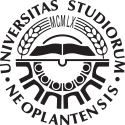15FM002 - Philosophy of Religion
| Course specification | ||||
|---|---|---|---|---|
| Course title | Philosophy of Religion | |||
| Acronym | 15FM002 | |||
| Study programme | Philosophy | |||
| Module | ||||
| Type of study | second degree master academic studies | |||
| Lecturer (for classes) | ||||
| Lecturer/Associate (for practice) | ||||
| Lecturer/Associate (for OTC) | ||||
| ESPB | 6.0 | Status | ||
| Condition | None | Oblik uslovljenosti | ||
| The goal | Philosophy of Religion is a systematic unity of philosophical reflection of the totality of the phenomena of faith, religion, religiosity and divine being. Philosophy and religion are the two forms of the spirit, which have the same thought object (absolute principle of everything), but the different types of relation to that object. Philosophy is based on the conceptual, religion is based on representational thinking. Because of that, philosophy can take religion as its thought object. As the elective course in sixth semester of BA studies in philosophy, Philosophy of Religion should enable students thorough study of the relation between philosophy and religion – in the first place, through the understanding of philosophical reflection of the concept of God and the representation of God (divine beings in general), essence of religion and particular aspects of religious phenomenon. | |||
| The outcome | The course should enable students the philosophical understanding of the essence of religion and provide an insight into the basic theological doctrines and great world religions’ concepts. | |||
| Contents | ||||
| Contents of lectures | Concept of God in philosophy; Faith and religious faith; Faith and knowledge; Concept of religiosity; Concept of religion (Forms of religious consciousness; Form of sensuality; Contemplation and representation; Immediate knowledge; Cult); Philosophy and theology (natural and rational); Philosophical concept of religion; Problem of foundation of philosophy of religion; Relation of philosophy of religion to religion; Relation of philosophy of religion to positive religion; Relation of philosophy of religion to sociology of religion and science of religion; Philosophy of religion as the critique of religion; Basics directions of the development of philosophy of religion; Natural religion and revealed religion; Proofs of the existence of God; Ontological and ethical meaning of the idea of immortality of soul; Concept of the freedom of religion; Concept and problem of secularization (Origins; Secularization as the political-legal concept; Secularization in the 19th century; Secularization dispute in the 20th century; Secularization as the theological-political concept; Dialectical theology. | |||
| Contents of exercises | Analysis of philosophical-religious texts | |||
| Literature | ||||
| ||||
| Number of hours per week during the semester/trimester/year | ||||
| Lectures | Exercises | OTC | Study and Research | Other classes |
| 2 | 2 | |||
| Methods of teaching | Lecturing, dialogical method, method of textual analysis. | |||
| Knowledge score (maximum points 100) | ||||
| Pre obligations | Points | Final exam | Points | |
| Activites during lectures | 15 | Test paper | ||
| Practical lessons | Oral examination | 60 | ||
| Projects | ||||
| Colloquia | 25 | |||
| Seminars | ||||

